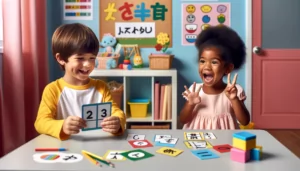Japanese culture is known for its rich traditions and customs, and greetings are no exception. Properly greeting someone in Japan is not just a polite gesture; it’s a reflection of respect and an integral part of daily life. In this article, we’ll explore the art of Japanese greetings, covering the most common expressions, their meanings, and when to use them.

✅ AI Essay Writer ✅ AI Detector ✅ Plagchecker ✅ Paraphraser
✅ Summarizer ✅ Citation Generator
The Top 5 Common Japanese Greetings
Let’s start by introducing the five most common Japanese greetings that you’re likely to encounter.
| Greeting | Meaning | Pronunciation | When to use it | Example |
| Ohayou Gozaimasu (おはよう ございます) | Good morning (formal) | Oh-ha-yo goh-zah-ee-mahs | This formal greeting is typically used before 10 in the morning, and certainly before noon. | “Ohayou gozaimasu! How are you today?” |
| Konnichiwa (こんにちは) | Hello | Koh-nee-chee-wah | Konnichiwa is a versatile greeting suitable for use between mid-morning and late afternoon or early evening. | “Konnichiwa! It’s nice to see you again.” |
| Konbanwa (こんばんは) | Good evening | Kohn-bahn-wah | This greeting is appropriate in the late afternoon or evening. | “Konbanwa! How was your day?” |
| Moshi Moshi (もしもし) | Hello (On the phone, informal) | Moh-shee moh-shee | Use “moshi moshi” when answering the phone informally. | “Moshi moshi! Who’s calling, please?” |
| Irasshaimase (いらっしゃいませ) | Welcome (Greeting a customer) | Ee-rah-shy-mah-seh | This is often heard in Japanese stores and restaurants when welcoming customers. | “Irasshaimase! Please have a seat.” |
Beyond the Basics
While the above five greetings cover a wide range of situations, Japanese culture offers a myriad of greetings for various occasions and levels of formality. Let’s delve deeper into some of them:
Tadaima (ただいま)
Meaning: I’m back (Arriving home)
Pronunciation: Tah-dah-ee-mah
When to use it: Use “tadaima” when announcing your return home.
Example sentence: “Tadaima! Did anything interesting happen while I was out?”
Yo (よ)
Meaning: Hi (Casual hello)
Pronunciation: Yoh
When to use it: “Yo” is an informal way to say hello, primarily used among friends.
Example sentence: “Yo! Long time no see.”
Sumimasen (すみません)
Meaning: Excuse me (Approaching a stranger)
Pronunciation: Soo-mee-mah-sehn
When to use it: Use “sumimasen” when you need to politely approach a stranger, such as asking for directions or the time.
Example sentence: “Sumimasen, could you help me find this address?”
Moshi Moshi (もしもし)
Meaning: I’m going to talk (On the phone, informal)
Pronunciation: Moh-shee moh-shee
When to use it: Use “moshi moshi” when answering the phone informally.
Example sentence: “Moshi moshi! Can you hear me clearly?”
Irasshaimase (いらっしゃいませ)
Meaning: Welcome (Greeting a customer)
Pronunciation: Ee-rah-shy-mah-seh
When to use it: This phrase is commonly used in retail environments to welcome customers.
Example sentence: “Irasshaimase! Please take your time looking around.”
Specific Situations and Formalities
In addition to these greetings, Japanese culture offers more specialized ways to greet people depending on the situation and level of formality. Here are a few examples:
Ojamashimasu (おじゃまします)
Meaning: I am going to disturb you
Pronunciation: Oh-jah-ma-shi-mahs
About: Use “ojamashimasu” politely when entering someone’s home or personal space.
Example sentence: “Ojamashimasu. I hope I’m not interrupting.”
Osewa ni Natteorimasu (お世話になっております)
Meaning: Thank you for your continued support
Pronunciation: Oh-seh-wah nee nah-teh-oh-ri-mahs
About: This formal phrase is frequently used in business settings as a sign of gratitude.
Example sentence: “Osewa ni natteorimasu. We appreciate your support.”
Ohisashiburi desu (おひさしぶりです)
Meaning: Long time no see
Pronunciation: Oh-hee-sah-shi-boo-ree dehs
About: Use “ohisashiburi desu” when you haven’t seen someone in a while, especially acquaintances and bosses.
Example sentence: “Ohisashiburi desu! It’s been too long.”
Informal and Casual Greetings
For those looking to engage in more relaxed conversations or interactions, Japanese offers informal greetings like “Yo,” “Oi,” “Yaa,” “Ossu,” and “Yaahoo.” These expressions are typically used among friends and young people, reflecting a casual and friendly tone.
Conclusion
Japanese greetings are an essential aspect of daily life and a window into the rich tapestry of Japanese culture. Whether it’s a formal “ohayou gozaimasu” in the morning or a casual “Yo” among friends, each greeting carries a specific meaning and reflects the intricacies of social etiquette. Embracing these greetings is not only a way to show respect but also a key to building meaningful connections in Japan’s vibrant society. So, the next time you greet someone in Japanese, remember the nuances and embrace the tradition with a warm and respectful demeanor.
FAQ
Follow us on Reddit for more insights and updates.





Comments (0)
Welcome to A*Help comments!
We’re all about debate and discussion at A*Help.
We value the diverse opinions of users, so you may find points of view that you don’t agree with. And that’s cool. However, there are certain things we’re not OK with: attempts to manipulate our data in any way, for example, or the posting of discriminative, offensive, hateful, or disparaging material.